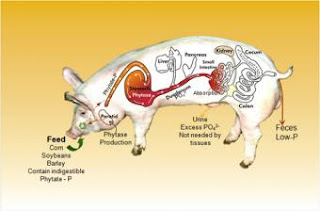Genetically modified pigs? It sounds ridiculous, but its true. This could eventually reach the United States if we don't take action now and help save the pigs, we must always support local farming!
Here is the story from "Think, Eat, Act" (http://www.thinkeatact.ca/):
Enviropig™ - attacking the wrong end of the problem
Intensive hog farming raises pigs in giant complexes that bear little resemblance to what most of us would call a farm. Now, science is ready to provide the hog industry with a pig that has been genetically engineered to include mouse and bacteria genes, as a technological response to deal with the pollution problems created by turning the raising of livestock into an industrial process. Enviropig™ may well be the first GMO food animal approved for human consumption in Canada - without regulatory guidelines - in spite of the existence of other simpler, cheaper, more effective and less invasive ways to deal with pollution from hog manure.
The genetically engineered "Enviropig"
One of most serious impacts of the rapid shift to intensive hog production in Canada is water pollution. By confining and feeding thousands of animals in huge barns, their manure has become a pollutant.
It is expensive to haul millions of gallons of liquid manure, so hog barn operators seek to spread manure on nearby land. The nitrogen and phosphorus in the manure fertilize crops, but too much of a good thing is a bad thing. Many lakes and rivers in Quebec and Ontario, as well as Lake Winnipeg in Manitoba have become seriously damaged due to phosphorus pollution, which occurs when all the nutrients contained in manure cannot be used by crops and instead wash into surface waters with rain water and snow melt.
The solution? Genetically engineer the pig!
That is what the University of Guelph is doing, with funding from Ontario Pork and the Canadian and Ontario governments. As a result of splicing in genes from a bacteria and a mouse, the genetically engineered pig is able to digest phytase, the indigestible form of phosphorus found in grains and beans.
This pig is trademarked “Enviropig” and has been patented in the US and China. But the pigs will still produce millions of gallons of manure which will still be spread untreated on farmland. The manure's odour, salt content, nitrogen content, and drug resistant microbes will not be affected by this genetic modification. Likewise atmospheric pollutants – methane, nitrous oxide, ammonia - will still be emitted from the manure. Enviropig™ certainly does not solve the environmental problems of industrial hog production.
The University expects to sell Enviropig™ breeding stock and collect license fees from farmers who would produce pork for sale to Canadian consumers and for export. However, many hog producers in areas that regulate manure spreading based on phosphorus content (Manitoba, Quebec) now add a phytase supplement to their feed. It has no net cost to producers because it improves feed efficiency - so the cost of the supplement is offset by reduced feed costs. Would hog producers use a genetically modified animal when a much cheaper, more flexible and more acceptable way to deal with phosphorus pollution exists?
Canadians have not had a say in whether or not we want genetically modified farm animals as part of our food and agriculture system. The federal government has stalled the process of developing a regulatory regime for GM animals. Yet Environment Canada has already approved the Enviropig™ for segregated reproduction and for export. The University has asked Health Canada to approve Enviropig™ for human consumption. It is likely that the Canadian Food Inspection Agency is reviewing Enviropig™ for feed safety, as the byproducts and dead stock would be rendered for animal feed. All data submitted by the University is kept secret from the public, as it is considered confidential business information. There is no mandatory labeling of GM foods in Canada.
The democratic values of openness, transparency, dialogue and freedom of choice are their absent from the Enviropig™ process.
The solution to environmental pollution caused by intensive livestock production is not to tinker with the genes of farm animals. Pollution is a management problem that can be solved by simple changes such as altering sources of feed, reducing concentration of livestock and changing manure management methods. If we accept genetically modifying animals to allow industry to avoid necessary changes, how far will we as a society go? Where do we draw the line?
GMO Pork? No thanks!
There is no genetically modified pork approved for sale in Canada, so far, but most of the pork sold in large grocery stores is produced on factory farms that have significant environmental impacts.
Factory farms also focus on just a few breeds of pigs which have been bred to withstand intensive production.
To support genetic diversity and healthy ecosystems with your consumer dollar, seek out sources of pork that use smaller scale, ecological farming methods and heritage breeds of pigs.
Organic
The Canadian standard for certified organic production specifically excludes genetically modified organisms, and recommends the use of livestock breeds that are adapted to organic production systems. Livestock breeds chosen for organic production should be adapted to local conditions and should have the characteristics of vitality and resistance to disease and the absence of disease and health problems specific to breeds or strains (page 10, Organic Production Systems General Principles and Management Standards PDF). The organic standard also calls for a feed ration balanced to meet the animals' nutritional requirements and for pigs it mentions the need for vegetable matter other than grain (page 12). The number of animals on an organic farm in relation to the space available for raising them also must be appropriate to local conditions, feed production capacity, livestock health, nutrient balance of livestock and soils, and environmental impact. (page 16).
Heritage Breeds
Heritage breeds are generally raised outdoors and on smaller mixed farms. The animals are well adapted to outdoor life, and thrive on a varied diet. Because smaller numbers of animals are kept on each farm, it is possible to balance manure output and the farm's crop fertilizer needs. When manure is composted, rather than liquified, manure management is even more environmentally friendly.
Find the meat you want to eat
To find sources of organic and heritage breed pork near you, check out the Eat Well Guideor Beyond Factory Farming's Buy Local Directory.
Stop Enviropig approval
If you do not want to have genetically engineered farm animals in Canada's food and agriculture system, it will be necessary to take your concerns into the public sphere and become active.
Learn about the issue, inform your networks and send a message to the decision-makers.Beyond Factory Farming is working with the Canadian Biotechnology Action Network in a joint campaign to stop Enviropig™ and prevent future genetically modified food animals (and fish) from becoming approved and marketed in, and from Canada.
Inform yourself
You can read more detailed information in the backgrounder, "Enviropig™: Genetically Engineering Pigs to Support Industrial Agriculture". This seven-page document answers the questions:
- What is Enviropig™?
- Is Enviropig™ An Environmental Solution?
- Who "Created" and Owns Enviropig™?
- Is Enviropig™ Safe?
- When will Enviropig™ be on the market?
- Do Farmers Need Enviropig™?
For on-going information and updates on new developments on this file, join our email list-serve.
For a global perspective on corporate control of livestock genetics, see Livestock breeding in the hands of corporations an article published in Seedling, January 2008.
Write to the Minister of Health
Write a letter to the federal Minister of Health and ask her to reject the request to approve "Enviropig™" for human consumption. This letter includes opposition to GM fish, which comes under the same regulatory category as genetically engineered pigs. Your letter will be copied to key bureaucrats in the Ministry as well as the Health critics in the other federal parties.
Spread the word
The resources on our website are available to be downloaded so you can print them and distribute them to your own networks.
Feel free to put a link to this website on your own website, and/or in your email signature.
Circulate this Action Alert to your email networks - feel free to add your own introduction but please do not edit the alert itself.
http://www.thinkeatact.ca/campaign/enviropig%E2%84%A2-attacking-wrong-end-problem



















No comments:
Post a Comment